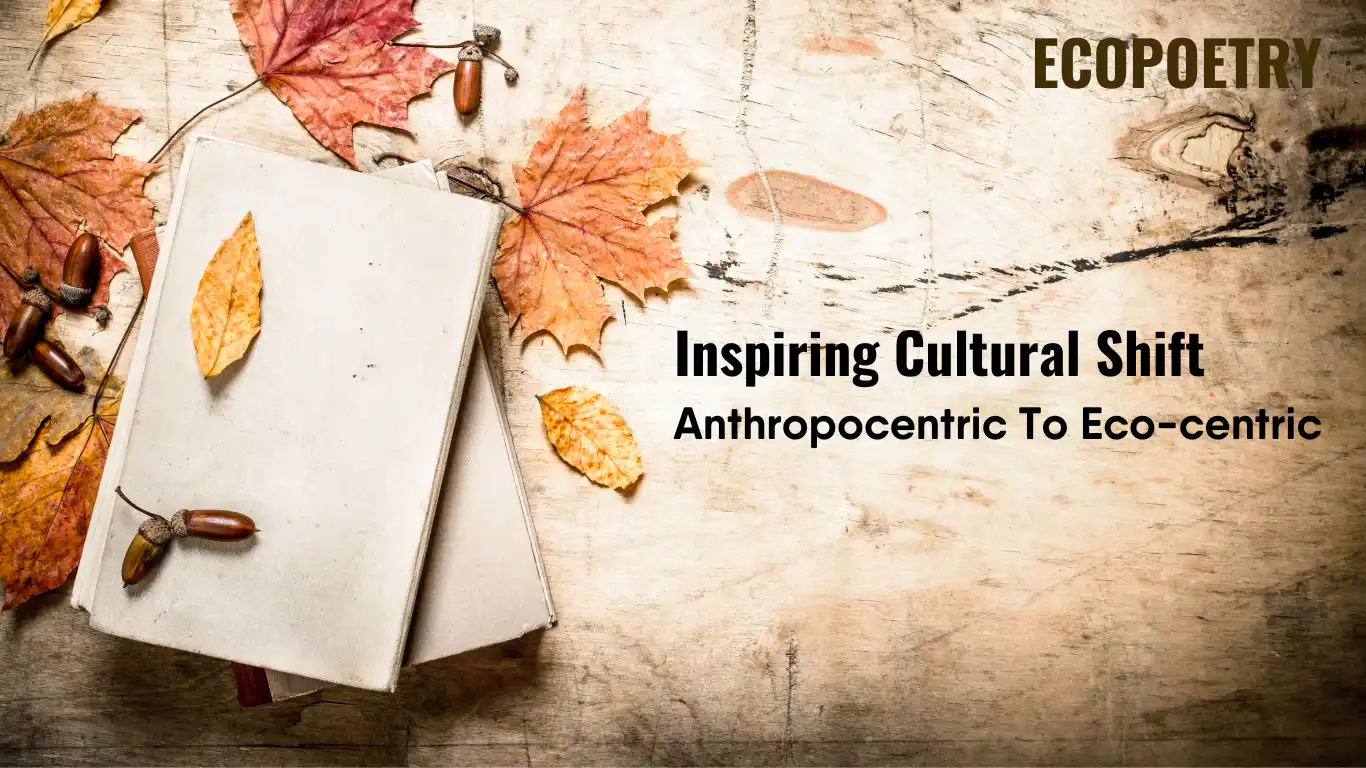What Is Ecopoetry?
Eco Poetry is a genre of poetry that focuses on the relationship between humans and the natural environment, addressing themes such as ecological awareness, environmental issues, and the interconnectedness of all living beings. It often reflects a deep respect for nature while critiquing humanity’s exploitation and degradation of the natural world. Eco Poetry can be lyrical, reflective, or politically charged, aiming to inspire a sense of responsibility and connection with the Earth. One well-known example is Robert Frost’s poem The Oven Bird:
“There is a singer everyone has heard,
Loud, a mid-summer and a mid-wood bird,
Who makes the solid tree trunks sound again…
…The bird would cease and be as other birds
But that he knows in singing not to sing.
The question that he frames in all but words
Is what to make of a diminished thing.”
Here, Frost starts by describing the bird and its qualities, emphasizing its crucial role in nature, and creating a sense of attachment in the reader’s heart. Gradually, he shifts to the bird’s potential endangerment, framing it as a reflection of the degrading environment. This shift mirrors ecopoetry’s broader mission: drawing attention to ecological issues while reminding us of nature’s beauty and importance. Here, the bird does not sing solely for humans, a subtle reminder that the environment exists independently of us, and its protection is not just for our benefit but a moral obligation.
Anthropocentrism: Human Development At Cost Of Nature
Historically, humanity’s worldview has shifted between anthropocentrism (human-centered) and ecocentrism (nature-centered). Ancient civilizations often lived in harmony with nature, viewing themselves as part of a greater ecological system. However, with the growth of scientific knowledge and philosophical thought during the 1500s, humanity began to consider itself superior to other forms of life.
The initial era of the industrial revolution of the 1800s heightened this mindset. It marked an era of relentless exploitation of natural resources, often without concern for replenishment. The Romantic movement, with poets like William Wordsworth, John Keats, and P.B. Shelley attempted to counteract this trend by celebrating nature’s beauty and its emotional resonance. For instance, Wordsworth’s I Wandered Lonely as a Cloud immortalizes the serene beauty of daffodils, evoking a sense of peace and connection to the natural world:
“Ten thousand saw I at a glance,
Tossing their heads in sprightly dance.”
Despite these efforts, Romanticism was ultimately overshadowed by industrial expansion and colonialism. Colonizing powers often dismissed indigenous cultures, which were more in tune with nature, as primitive. Under the guise of “civilization,” colonialists exploited lands and resources while spreading an anthropocentric worldview globally. Rudyard Kipling’s notion of the “white man’s burden” exemplifies this mindset, justifying environmental degradation as part of a supposed civilizing mission.
Even in literature, for the longest time, the environment was often relegated to the status of a backdrop or, at most, a symbolic reflection of a character’s emotions. This anthropocentric (human-centric) approach stems from humanity’s tendency to view the world as revolving around itself. All natural resources, the flora, the fauna, even the inanimate ones have long been seen as tools for human use rather than as entities deserving respect and preservation. The consequences of this one-sided relationship have been catastrophic, leading to the unchecked exploitation of nature.
Importance Of Ecopoetry
Literature acts as a mirror to society, reflecting its flaws and ideals. However, it is not just any mirror—it has the power to create an ideal picture of what the world could be by magnifying its flaws. Throughout history, literature has played an integral role in revolutions against dominant powers. For example, postcolonial literature challenged colonial narratives, while feminist literature countered patriarchy. Similarly, ecopoetry emerges as a response to the ecological crises caused by human activity.
Poetry has a unique ability to connect emotionally with its audience. It can transcend academic and political limitation to resonate on a global level. Percy Shelley in, A Defence Of Poetry, famously described poets as “the unacknowledged legislators of the world”. This sentiment emphasizes the transformative power of poetry in shaping public consciousness and inspiring action.
How Ecopoetry Connects Us With Nature
Ecopoetry is a powerful tool for fostering environmental awareness for several reasons:
Memorability and Curiosity
Through rhyme and rhythm, ecopoetry creates vivid imagery that lingers in the reader’s mind. Take Sara Coleridge’s poem Trees:
“The Oak is called the King of trees,
The Aspen quivers in the breeze,
The Poplar grows up straight and tall,
The Peach tree spreads along the wall…”
The poem’s simplicity and rhyme make it easy to remember, while the detailed descriptions encourage readers to learn more about the trees it mentions.
Emotional Resonance
Poetry’s brevity and intensity touch emotional chords. For instance, Mary Oliver’s Wild Geese connects the individual’s struggles to the broader natural world
“You do not have to be good.
You do not have to walk on your knees
for a hundred miles through the desert, repenting.
You only have to let the soft animal of your body
love what it loves.”
Such poems remind us of our place in nature and evoke a sense of belonging and responsibility.
Broadening Perspectives
Ecopoetry challenges anthropocentric worldviews, encouraging readers to see the environment as more than just a resource for human use. Wendell Berry’s work often emphasizes this interconnectedness. In The Peace of Wild Things, he writes:
“When despair for the world grows in me…
I come into the peace of wild things
who do not tax their lives with forethought
of grief. I come into the presence of still water.”
Berry’s words inspire a sense of humility and reverence for nature’s inherent wisdom.
Philosophical Insight
Ecopoetry holds the potential to open out lyrical, meditative, and contemplative space to reflect on aspects of experience and themes in a deeply subjective manner, providing unique worldviews, insights, and philosophical ideas that can be far reaching. For instance, Henry David Thoreau’s poem from his collection Walden reflects upon the beauty and importance of connectedness with nature over the chaos of living in a city.
“For I’d rather be thy child
And pupil, in the forest wild,
Than be the king of men elsewhere,
And most sovereign slave of care:
To have one moment of thy dawn,
Than share the city’s year forlorn.“
Looking back at Thoreau’s poem, one can see how the conflict between nature & development has always marked human thought. It is interesting to note that the popular cultural term ‘Brainrot’ making it’s waves in hyper consumerist 2024 world was originally mentioned in Walden by Thoreau.
Explore the complete meaning of Henry Thoreau’s poem – Nature.
Conclusion
Ecopoetry is not merely an artistic expression but a call to action. It combines emotional depth with intellectual engagement, making environmental issues relatable and urgent. In a world increasingly dominated by technological and industrial pursuits, poetry reminds us of the beauty, value, and fragility of nature.
While scientific innovation and policy changes are vital for addressing environmental challenges, they need the emotional and cultural momentum that poetry can provide. As eco-poets continue to rise to this challenge, their work serves as a bridge between scientific facts and human emotions, inspiring a collective effort to protect the world we share.
The role of ecopoetry is, therefore, indispensable. It invites us to step out of our anthropocentric bubble and embrace a more ecocentric worldview. In doing so, it not only enriches our understanding of the natural world but also sows the seeds of a sustainable future. As we read and write ecopoetry, we contribute to this movement, ensuring that the voices of nature are heard and cherished.






